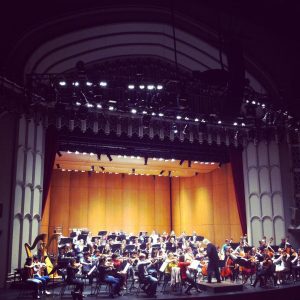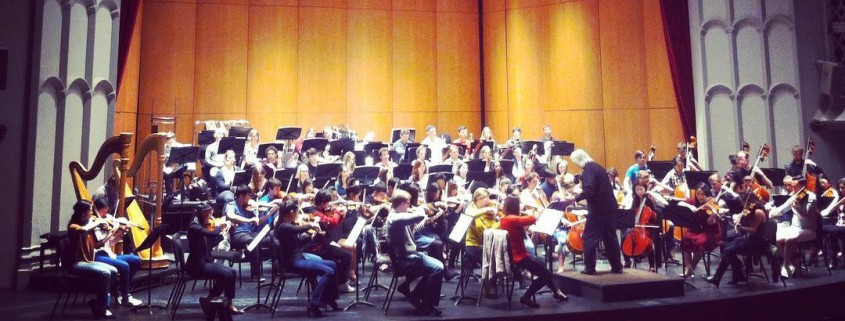USC Thornton Symphony opens season with dramatic performance
A musical journey reflecting the ideas expressed in the concert’s title “Fate and Freedom” was the focus of the Sept. 9 evening’s concert in Bovard Auditorium. Hosted by the USC Thornton School of Music and Visions and Voices, the evening showcased Giuseppe Verdi’s overture, La forza destina, Gustav Mahler’s Ich bin der welt abhanden gekommen culminated in Pyotr Liych Tchaikovsky’s Symphony No. 4.

Photo courtesy of USC Thornton School of Music
Take a bow · The USC Thornton Symphony Orchestra performed a powerful rendition of composer Tchaikovsky’s Symphony No. 4.
Led by music director Carl St. Clair, the symphony seemed to not simply perform the pieces of the evening, but embody them. It has been St. Clair’s lifetime work and emphasis to not only perform works, but to understand the context and the life history of the composers who wrote them.
With Verdi’s La forza del destino, the orchestra reacts seamlessly with St. Clair’s conducting style perfecting the excitement and changing moods throughout passages of the piece. Synergistic performances in the string section balanced with equal depth of understanding from the wind instruments allow the orchestra to mix between musical turmoil and the simplest of solo passages with emotional ease. The orchestra performed on another level, not often expected from student musicians, yet perfected by St. Clair. St Clair commented on Verdi’s relationship with fate.
“If you look at the last acts of Otello, Don Carlos, Rigoletto, especially Aida, you feel that Verde himself is already beginning to work through music, the acceptance of fate,” St. Clair said.
The performance of Gustav Mahler’s Ich bin der welt abhanden gekommen provided a perfect example of student musicianship. Performed in collaboration with guest Mezzo-soprano Kristen Rothfuss Erbst echoing the lyrical sentiment of isolation and fate, further emphasizing the evening’s theme described by St. Clair as “a certain ambivalence, a certain afraid-ness and certainty, but at the end resignation, expectance.” A gradual drawn-out symphonic passage builds up sprinkled with vocal solos by Erbst. The difficult passages in the piece were perfectly executed, a pure display of musicianship by the performers.
The turbulent period in Tchaikovsky’s life led to the composition of Symphony No. 4. The final piece of the evening was precluded by a hybridized performance of sections of Symphony No. 4 accompanied by dramatic performance featuring passages from Tchaikovsky’s letters to his friend Madame Von Meck with actor David Prather as Tchaikovsky and actress Lily Knight as Meich. The monologues contributed a unique multimedia performance that brought life, context and meaning to Tchaikovsky’s piece. The performance not only emphasized the composition itself but also the equally important story behind the composition, making a beneficial impact and creating aneducational opportunity.
“The piece represents a musical acceptance of fate and the ultimate freedom his music allows us.” St. Clair said.
A precise mosaic of passages and ideas exuded drama and fate. All of the sections were balanced and played well off each other. An oboe solo in the second movement met with the strings, displaying the personal conflict of Tchaikovsky. The musicians brought their performance to dramatic extremes providing a triumphant cap to an already well-executed performance. With a standing ovation, St. Clair held up the physical score in front of the audience as if directing the attention to the real star of the evening.
The next Thornton Symphony concert titled “Dance as Music” will take place on Sept. 23 at 7:30 p.m. in Bovard Auditorium. The symphony, conducted by Sharon Lavery, will perform Stravinsky’s Petrushka and Ravel’s Bolero.

